First Jewish Encounter: Rabbis in Uniform Fences were one of the symbols of the Holocaust: a symbol of loneliness, of separation from the free world, and of disappointment with the Jewish world overseas. Indeed, the opening of the gates of freedom constituted a first encounter not only with the liberating army but also with the first Jews who came from “over there.” Military rabbis and Jewish soldiers arrived with the American army, the British army, and the Polish and Yugoslav companies that were attached to it, as well as with the French and Dutch armies. Most [Read more]
First Jewish Encounter: Rabbis in Uniform
Fences were one of the symbols of the Holocaust: a symbol of loneliness, of separation from the free world, and of disappointment with the Jewish world overseas. Indeed, the opening of the gates of freedom constituted a first encounter not only with the liberating army but also with the first Jews who came from “over there.” Military rabbis and Jewish soldiers arrived with the American army, the British army, and the Polish and Yugoslav companies that were attached to it, as well as with the French and Dutch armies. Most of them were young, and the training of the rabbis among them – Orthodox and Reform chaplains – was to take care of the religious needs of the Jewish soldiers. This did not require special Torah education, and they were certainly not prepared for the dramatic encounter they encountered in Europe. Only a few of them knew the Jewish world before the war or had a history of Jewish activity (such as Rabbi Zvi Azaria-Helfgott from the Yugoslav army and Rabbi Heszel Klepfisz from the Polish army, who was a religious journalist in Poland). Only a few knew the Yiddish language – the language of most survivors.
(Adapted from Rebbetzin Esther Farbstein’s Hidden in Thunder)
Before you is a collection of stories, photographs, and testimonies from Ganzach Kiddush Hashem that tell of the unique encounter with the liberating soldiers.
Rabbis in the Occupying Forces (Excerpt from Rebbetzin Esther Farbstein’s Hidden in Thunder)
Rabbis in the Occupying Forces (Excerpt from Rebbetzin Esther Farbstein's Hidden in Thunder)
Shema Ba'Ya'ar (Hebrew)

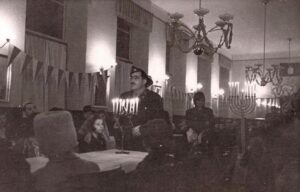
An American Jewish soldier lights Chanukah candles in a DP camp
Rabbi Herschel Schacter 's First Meeting with Lulek Lau
Rabbi Herschel Schacter 's First Meeting with Lulek Lau
I also remember the American soldiers entering the camp gates. Later, I learned that they were part of the Sixth Armored Division of General George S. Patton's Third Army. I recall their expressions when they caught sight of the faces of the muselmanner (the living dead), gaunt as scarecrows in their striped uniforms; the bodies; and the rivers of blood from those caught in the hailstorm of the bullets. With their remaining ammunition, the departing Germans had shot everyone in thier path. I saw the American soldiers freeze in place, shocked into silence. I was also frozen, petrified of the new army that had entered the camp gates. I did not know whether they were for us or against us, so I hid behind a pile of bodies. The chaplain of the U.S. Third Army was Rabbi Herschel Schacter, who later became chairman of the Conference of Presidents of Major American Jewish Organizations. In full army uniform, Rabbi Schacter got down from his jeep and stood before the pile of bodies. Many of them were still bleeding; some groaned in pain. Suddenly, he thought he saw a pair of eyes, wide open and alive. He panicked and, with a soldier's instinct, drew his pistol. Slowly, carefully, he began to circle the pile of bodies. Then - and this I recall clearly - he bumped into me, a little boy, staring at him from behind the mound of corpses, wide-eyed. His face revealed his astonishment: in the midst of the killing field, in that sea of blood - suddenly, a child appears!
I did not move. But he knew that no child in this place could be anything but Jewish. He holstered his pistol, then grabbed me with both hands and caught me in a fatherly embrace, lifting me in his arms. In Yiddish with a heavy American accent, he asked me: "Wie alt bist due, mein Kind?" (How old are you, my boy?).
I saw tears dripping from his eyes. Still, through force of habit, I answered cautiously, like someone perpetually on guard: "What difference does it make? At any rate, I'm older than you." He smiled at me from behind his tears, and asked, "Why do you think that you're older than I am?" Without hesitating, I replied, "Because you laugh and cry like a child, and I haven't laughed for a long time. I can't even cry anymore. So which one of us is older?"
Then he introduced himself to me, and the tone of our conversation eased. Rabbi Schacter asked who I was. Lulek from Piotrkow, I replied.
"And who is your family?" he inquired?
"My father was the rabbi of Piotrkow."
"And you're here all alone, without your father?"
"Without my father, without my mother. But I have a brother. He collapsed and is lying sick, here in the camp."
Rabbi Schacter gained my full trust when he told me he had heard of my father. He had also heard of Father's cousin Rabbi Meir Shapira, the rabbi of Lublin, who had initiated the Daf Yomi daily-page program of Talmud study. I was thrilled.
Then the American rabbi took me by the hand, and together we made the rounds of the barracks, announcing the liberation. We entered some of them together; others he entered alone. I remember people lying inside, with blank stares, without even the strength to get up from their bunks. These people were not among those who could run to the camp gate and shout "Hooray!" with the rest. "Jews, you are liberated!" called out the American rabbi in Yiddish. The inmates gazed at him, incredulous, as if to ask, "Who is this crazy meshiggener standing here in uniform, screaming in Yiddish?"
Indeed, it was a strange, surrealistic sight. The prisoners lay emaciated and prone on wooden planks, while before them stood Rabbi Herschel Schacter, upright and strong, a messenger of the redemption.
(Rabbi Israel Meir Lau, Out of the Depths)
Avraham Gershon Fonfeder – Liberation of Budapest (Budapest, Hungary)

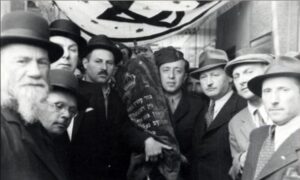
A hachnasat sefer Torah (Torah inauguration ceremony) in the Linz DP camp, Austria. An American Jewish soldier holds the Torah.
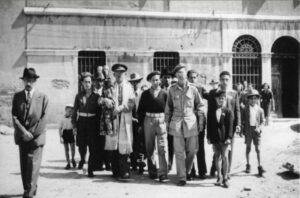
Rabbi Lifshitz accompanied by soldiers of the Jewish Brigade, one of them holding a Torah
Shomrim Al HaKesher (Hebrew)

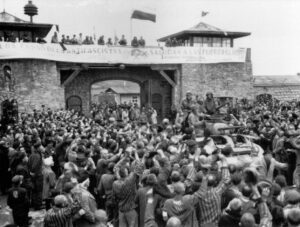
Prisoners of Mauthausen rejoice as they greet the liberating soldiers
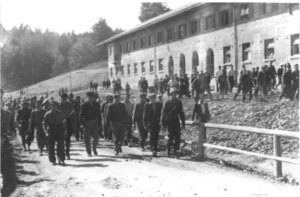
General Eisenhower's visit to the Feldafing DP camp
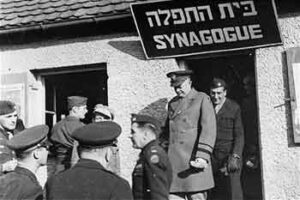
General Eisenhower at the entrance of a synagogue in a DP camp
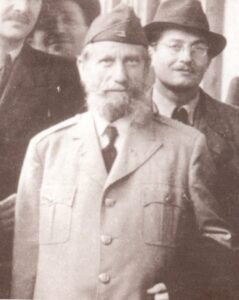
Rabbi Eliezer Silver, president of the Vaad HaHatzalah (Rescue Committee) in the US, wearing an American Army officer uniform
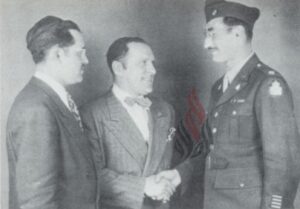
Elimelech Tress (centre) and Rabbi Moshe Scherer meeting with Rabbi Aaron Paperman, a US Army officer in WWII, on behalf of the survivors
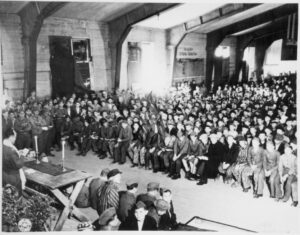
The first Shavuot after liberation, Buchenwald camp

A Chanukah party for children in the Furth DP camp, Germany. The gifts were donated by the families of the American soldiers who lived in the army camp in Nuremberg.
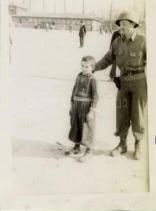
A Jewish child in the Buchenwald concentration camp, Germany. Next to him is an American Army liberating soldier.
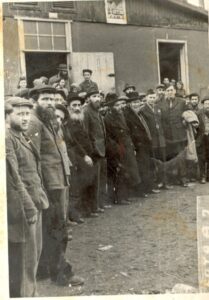
Surviving Jews with rabbis and members of the Vaad HaHatzalah (Rescue Committee) wearing US Army uniforms, in the Poking DP camp, Germany
Liberation on the Week of the Torah Portion Behar
Liberation on the Week of the Torah Portion Behar
We asked the Americans if there was a Jew among them. One officer pointed in a particular direction. I left my sick friend and ran in the direction in which they had pointed. When I met the soldier, the first thing I asked him was whether he was Jewish. He spoke a little Yiddish, but instead of answering me, he took a prayer book out of his pocket. I didn't know what to do at such a moment and how to express my joy and happiness. After all, he was the first Jew I had encountered who came from beyond the barbed-wire fence. I fell into his arms and kissed him wholeheartedly because now I felt that I was again a free person, that I was again a human being and not just a number, that I was a Jew who was nevertheless allowed to breathe. I have no words to describe that great joy. ... Shlomo (Stanley) Leifer - that was our soldier's name - prepared a room for us with two made beds in it; for himself he set a place to sleep on the floor. For us it was a big event, After more than two years, we were once again entering a human dwelling and being offered beds with mattresses and sheets, pillows and blankets. May God repat Shlomo Leifer for all the good and kindness that he did for us out of great love.
It was Saturday night. Having no kosher wine, I asked Shlomo for a glass of milk to make havdala (ceremony upon the completion of Shabbat). It was a tremendous havdala. Not just marking the distinction between the sacred and the profane and between the seventh day and the six days of work, but also a distinction between slavery and freedom, between subjugation and redemption.
On that Shabbat, of the Torah portion Behar Sinai, May 5, 1945, we became - through God's kindess - free men.
(Rabbi Sinai Adler, Be-Gei Tsalmavet)
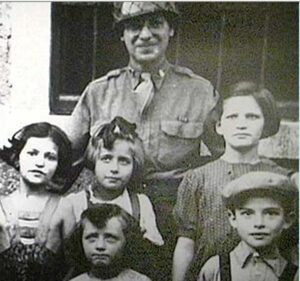
American Army rabbi with children in the Bad Gastein DP camp, Austria
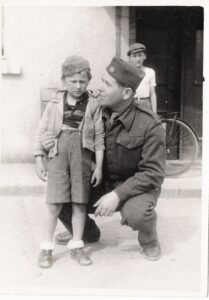
A soldier in uniform embraces a small child, a survivor, in a DP camp
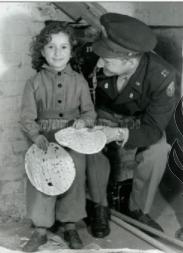
An American Jewish soldier giving matzah to a child in a DP camp in Germany
Heszel Klepfisz - The Liberation of Bergen-Belsen, A Rabbi in the Liberating Polish Army

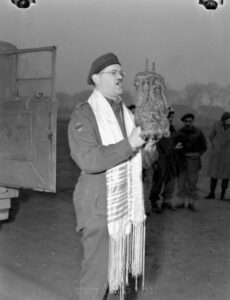
Captain Samuel Kass of the Canadian Army, holding up a Torah, arranged the first Jewish prayer service on German soil.
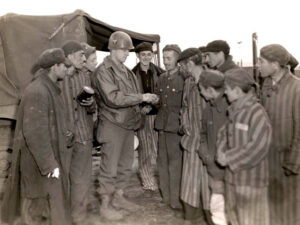
Private Hershel Wright of the US Army distributes oranges to liberated Jews
Zalman Cohen – Rabbi Hershel Schachter and the First Yizkor Prayer in Buchenwald (Nyiregyhaza, Hungary)

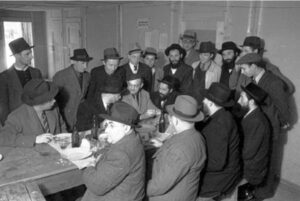
An American officer visiting the Feldafing DP camp in Germany, surrounded by charedi (ultra-Orthodox) Jews
Menachem Haberman - The Liberation of Buchenwald, Rabbi Herschel Shacter (Munkacs, Czechoslovakia)

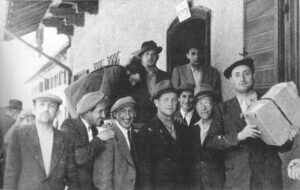
Survivors in the Feldafing DP camp holding food packages and judaica that they received from the US Army Lieutenant Meyer Birnbaum
Masha Bayla Yoshzef - The Russan Officer's Jewish Spark (Dej, Romania)

Rabbi Israel Meir Lau - Liberation Day in Buchenwald & the Meeting with Rabbi Herschel Schacter (Piotrkow, Poland)

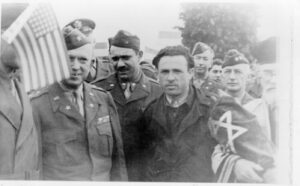
Jewish soldiers in the US Army, among the liberators of a camp, with the military rabbi
Chaim Binyamini - The End of the War (Budapest, Hungary)

Rabbi Meyer Birnbaum
Rabbi Meyer Birnbaum
Rabbi Meyer Birnbaum served as an officer in the army during World War II, fought against the Nazis and was among the liberators of Jews from the Nazis, particularly from the Buchenwald camp.
When the war broke out, Rabbi Birnbaum was a young man of about twenty, a resident of Brooklyn. He received a draft order for the US Army to his home, and despite his misgivings and understandable desire not to enlist, he was eventually drafted into the army and sent to the battlefields.
On the eve of his enlistment, he spoke with Rabbi Yitzchak Hutner z"l, to whom he was close. "Every day, recite Psalms chapter 91 at least twenty times - 'He who sits in the shelter of the Most High' - and G-d willing you will return home safe and sound," encouraged Rabbi Hutner. Despite this, Birnbaum prepared a will in which he instructed that if, G-d forbid, he did not return from the war - his money should be transferred to the yeshiva of the rabbi.
In the army, Birnbaum had to deal with many difficulties, which stemmed from his being Torah and mitzvah observant in a non-Jewish environment. However, his commanders recognized the high potential inherent in him, and insisted on sending him to an accelerated officer course at the officer school. He then commanded several units and participated in five campaigns, one of which was the famous invasion of the Allied forces in Normandy.
Towards the end of the war, his unit arrived in Germany and he was one of the first soldiers to enter the chain of camps that bore the general name "Buchenwald." There he was subjected to a series of harrowing and chilling experiences, some of which are documented in photographs he took himself and published in his autobiography, "Lieutenant Birnbaum."
Some time after entering the camp, he was deeply effected by the horror that unfolded before his eyes, and its monstrous dimensions only then dawned on him. On one occasion, as he was sitting in his tent preparing a military report, one of the soldiers approached him and informed him that two young Germans wanted to talk to him. "Take the Germans to the forest and make sure there are two less anti-Semites in the world!" Birnbaum responded angrily, without batting an eyelid.
A minute later the soldier returned to him. "The two are asking if you know that they are Jews," he said. A shock gripped him at the soldier's words. With one hasty thought and one hasty statement, he almost brought about the elimination of two of his Jewish brothers!
He stood up and stormed out of the tent to meet the two young men. "You spoke German to me!" the soldier, who at first thought they were Germans, defended himself. "In what language did you want us to speak to you, perhaps in Yiddish?! You are not Jewish, so we spoke to you in German!" the two replied.
Meyer sent the soldier on his way and began talking to the two. They were two chassidic boys, Yossel and Leibel Bornstein. They were looking for a Jew among the soldiers, and when they learned that one of the commanders was Jewish, they wanted to meet him.
Meyer burst into tears and asked for their forgiveness for having just a minute ago wanted to eliminate them. They had one wish: to put on tefillin. He offered them his tefillin, but they did not know how to put them on. When the war broke out, they were under bar mitzvah age, and had not seen tefillin since. With great excitement, he helped them put on tefillin. Afterwards, he let them feast their hearts out on cookies and sardines.
Excerpted from an article originally published in Hebrew on BeChadrei Charedim.
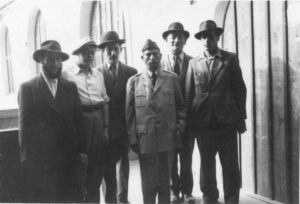
Rabbi Eliezer Silver, one of the heads of the Vaad HaHatzalah (Rescue Committee) in the US, visits the DP camp in Salzburg, Austria, wearing an American officer uniform.
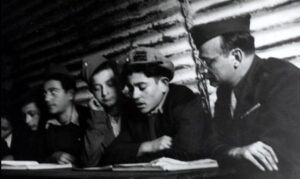
Young men study Germara in the Poppendorf DP camp, Germany. An American Jewish soldier joins them.
Dov Silber - The First Prayer Post Liberation in the Buchenwald Camp (Piotrkow, Poland)

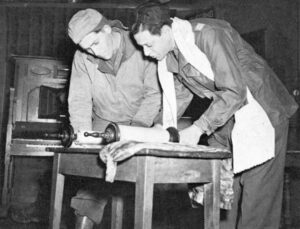
Jewish soldiers read from the Torah in the American Army synagogue















































